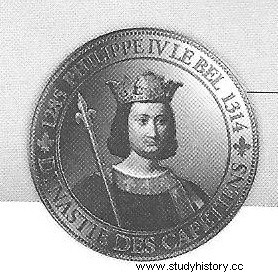
Inside the kingdom, Philippe, advised by his lawyers, wants to strengthen the monarchical authority in the same way. Enguerrand de Marigny, head of the royal administration, worked tirelessly to extend the authority of his master. Considering himself placed "naturally" at the top of the feudal pyramid, Philip believes that his authority must descend to the last of his vassals.
The king must take interest in all levels of this pyramid, to possibly protect the vassals against their direct suzerain. He did not hesitate to send his officers when a conflict arose between suzerain and vassal. fiefs without the consent of the prelates and lords concerned. The king and the lawyers, continuing the work of Saint Louis, also attached themselves to the improvement of the central institutions.
The former Curia regis was divided into three more specialized Chambers, the Grand Council, Parliament and the Chamber of Accounts. This transformation will be completed under Philip V.
By various ordinances, that of 1291, the great ordinance of 1303, that of 1307, the functioning of the parliament is regulated, also divided into three Chambers:the Grand Chamber and two Chambers of Requests, one in langue d'oïl, the other in langue d'oc. The chancellery developed as well as the Hôtel le Roi, which provided Philippe with a number of advisers. The Assembly of the kingdom, made up of prelates, barons, representatives of the cities, convened in April 1302 against the pope, will be convened again thereafter.
For the sake of better performance, because the problem of financial resources was essential for him, Philippe IV, with the help of Nogaret, undertook to reform the financial administration, by the ordinance of 1303 in particular. Marigny reformed the Treasury and, the very year of the king's death, prepared a major financial reform, especially fiscal, for the study of which the states were convened in August.
Since his accession to the throne, Philippe had to face considerable financial problems. The king begins by following the sometimes more than questionable policy of his predecessors. The Jews, who possessed considerable claims, were persecuted, threatened with expulsion if they did not surrender their "usurious profits" to the king, or simply burned.
In 1306, all the Jews of the kingdom were banished, their property seized, their claims "put into the hands of the king". In fact, most banished people redeem themselves and stay in France. The Lombards know a fate hardly sweeter. Only Mouchet and Barbet, who lend the king considerable sums, are safe from persecution. These various measures proved insufficient in the face of the growing needs of the monarchy.
As early as 1294, "subsidies", hundredths and fiftieths, a kind of income tax, were levied. Operation repeated in 1296 “for the defense of the kingdom”. The king limits the right of certain barons to mint coins or to possess gold tableware. which, as we have seen, inaugurates the conflict with Boniface VIII.
Philippe and his advisers also try to improve the collection of taxes, the king advises his officers to use gentleness and persuasion. In vain, the money continues to be lacking, the king's subjects are increasingly dissatisfied. As early as 1293, Philip carried out the first financial manipulations, minting a new currency lower in law than that issued by his predecessors. In the aftermath of the disaster in Flanders, new gold coins were minted, écus, worth 72 sols 6 deniers, while the gold écu minted under Saint Louis was worth 21 sols 6 deniers. Similarly, the large silver tournaments only had a third of its value in 1306, a measure benefiting debtors, who would repay in weak currency what they had borrowed in strong currency, or holders of cash.
In Paris when, following the edict of 1306, the landlords decided to raise rents, the common people rose up, looted the house of Etienne Barbette*, who was in charge of the Mint, and besieged the king in the dungeon of the Temple, where he remains stuck for two days. Twenty-eight rioters will be hanged on January 5, 1307. This will not prevent the king from continuing his financial alterations:the golden lamb created in 1311 during 15 tournament grounds, will be worth 20 the following year.
